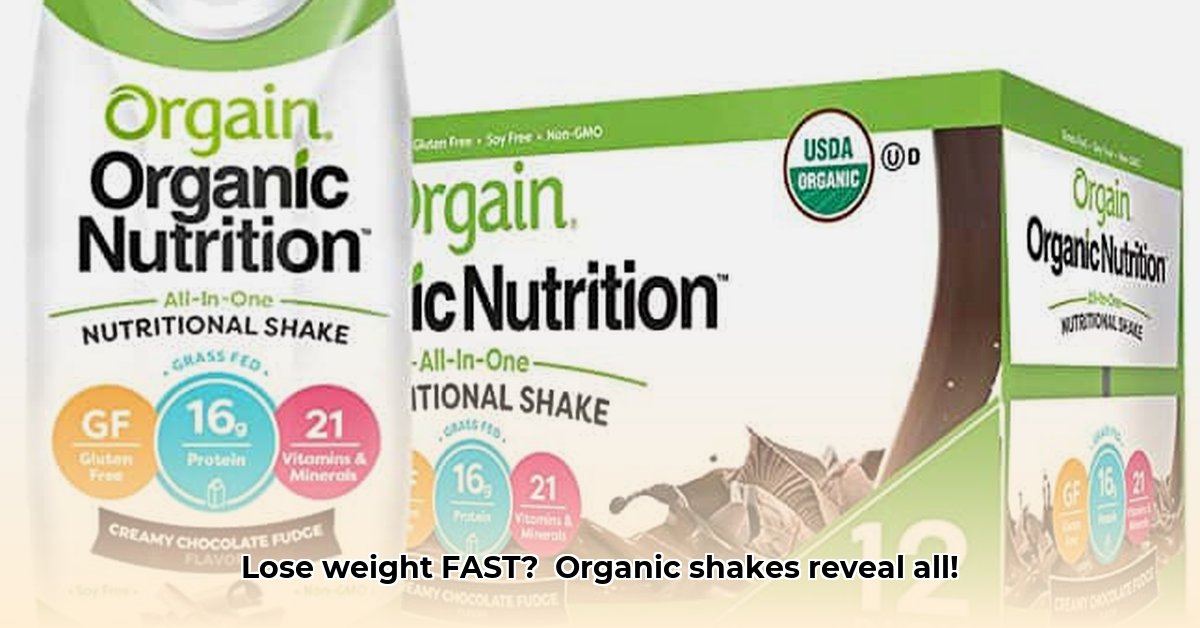
Understanding Organic Meal Replacement Shakes for Weight Loss
The market for meal replacement shakes is booming, with numerous brands promising rapid weight loss. However, not all shakes are created equal. Organic meal replacement shakes, while potentially offering benefits, require careful consideration. This guide provides actionable steps to help you navigate this complex landscape and make informed choices for safe and effective weight management. A key question to consider: Are organic meal replacement shakes truly superior for long-term health and weight loss, or is the hype outpacing the reality?
Deciphering the Marketing: Fact vs. Fiction
Many claims surrounding organic meal replacement shakes require critical evaluation. While organic certification suggests reduced pesticide exposure and potentially higher nutrient density in some instances, this doesn't automatically translate to superior weight loss or overall health benefits. The "organic" label alone is insufficient; a thorough examination of the nutritional profile is essential. Remember, a balanced diet and regular exercise remain cornerstones of any successful weight loss plan.
What to Look For in a High-Quality Organic Shake
Choosing the right organic meal replacement shake involves scrutinizing the ingredient list and nutritional information. Key factors to consider include:
- Protein content: Adequate protein is crucial for satiety and muscle maintenance. Aim for 20-30 grams per serving.
- Fiber content: Fiber promotes fullness and digestive health. Target 5-10 grams per serving.
- Healthy fats: Include healthy fats for sustained energy and hormone regulation. Aim for 5-10 grams per serving, emphasizing sources like avocado oil, nuts.
- Sugar content: Minimize added sugar. Less than 10 grams per serving is ideal. Avoid artificial sweeteners.
- Whole-food ingredients: Prioritize shakes made with whole foods like fruits, vegetables, and whole grains over artificial ingredients and fillers.
- Micronutrient profile: Check for a sufficient supply of essential vitamins and minerals.
A Step-by-Step Guide to Choosing the Right Shake
Here's a practical framework to help you select a suitable organic meal replacement shake:
Become a Label Detective: Carefully examine the ingredient list. Look for recognizable, certified organic ingredients. Avoid artificial colors, flavors, and sweeteners. "Certified organic" doesn't mean "automatically healthy", so compare ingredient lists between different products carefully.
Prioritize Whole Foods: Meal replacement shakes should supplement, not replace, a balanced diet rich in fruits, vegetables, and whole grains.
Seek Professional Guidance: Consult a registered dietitian or healthcare professional to create a personalized plan that considers your individual needs and health goals.
Listen to Your Body: Pay attention to how the shake affects your hunger levels and overall well-being.
Weighing the Pros and Cons: Organic vs. Conventional
Pros of Organic Meal Replacement Shakes:
- Reduced pesticide exposure: Minimizes potential exposure to harmful pesticides.
- Potentially higher nutrient density (some research suggests): While not consistently proven, organically grown produce may contain higher levels of certain nutrients. More research is needed.
- Environmentally friendlier production: Organic farming practices generally contribute to better environmental sustainability.
Cons of Organic Meal Replacement Shakes:
- Higher cost: Organic options usually come at a premium price.
- Limited availability: The selection of organic shakes might be smaller compared to conventional options.
- No guaranteed weight-loss miracle: The "organic" label does not guarantee superior weight loss results. A healthy lifestyle is paramount.
The Long-Term Perspective: Sustainable Weight Management
While organic meal replacement shakes can assist short-term weight loss, long-term success requires a more holistic approach. Over-reliance on shakes can lead to nutritional deficiencies and unhealthy habits. A sustainable weight-loss strategy includes:
- Balanced diet: Emphasizing whole foods and a variety of nutrients.
- Regular exercise: Incorporating physical activity into your routine.
- Mindful eating: Paying attention to satiety cues and avoiding emotional eating.
- Professional guidance: Seeking help from a registered dietitian or healthcare provider.
Key Takeaways:
- Organic meal replacement shakes offer convenience but should be used judiciously.
- Thorough label reading and nutritional analysis are crucial for informed decision-making.
- Organic certification alone doesn't guarantee optimal health benefits; consider the complete nutritional profile.
- Long-term use requires careful monitoring for potential nutrient deficiencies.
- Consult a healthcare professional for personalized advice and guidance.
This comprehensive guide equips you with the knowledge to make informed choices and safely integrate organic meal replacement shakes into your weight-loss journey. Remember, lasting weight management hinges on a holistic approach that combines healthy eating, regular exercise, and mindful lifestyle choices.